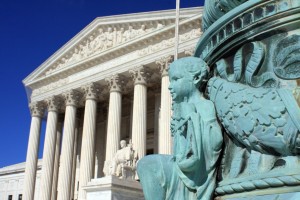** Appeal Court Panel Holds That Genuine Dispute Remained As To Whether All Natural Claims Would Survive Reasonable Consumer Test **
By: Brent E. Johnson  Judge Lucy H. Koh gave all natural class defendants cause for celebration back in 2014 when she closed the door on a putative class representative’s claim that Dole’s fruit juices and fruit cups were wrongfully labelled as “All Natural.” Brazil v. Dole Packaged Foods, LLC, No. 12-CV-01831-LHK, 2014 WL 6901867 (N.D. Cal. Dec. 8, 2014). Last week, however, the Ninth Circuit re-opened that door slightly – at least enough for the plaintiffs’ bar to try to squeeze their feet in.
Judge Lucy H. Koh gave all natural class defendants cause for celebration back in 2014 when she closed the door on a putative class representative’s claim that Dole’s fruit juices and fruit cups were wrongfully labelled as “All Natural.” Brazil v. Dole Packaged Foods, LLC, No. 12-CV-01831-LHK, 2014 WL 6901867 (N.D. Cal. Dec. 8, 2014). Last week, however, the Ninth Circuit re-opened that door slightly – at least enough for the plaintiffs’ bar to try to squeeze their feet in.
Mr. Brazil alleged in his 2012 Complaint that Dole’s fruit cups and fruit juices were falsely labelled as “All Natural” because they contained citric acid (i.e. vitamin C) and ascorbic acid (used to prevent discoloring). Dole successfully argued on summary judgment that Plaintiff had failed to show that a significant portion of the consuming public or of targeted consumers, acting reasonably under the circumstances, would be misled by its labeling. Id. at *4, citing Lavie v. Procter & Gamble Co., 105 Cal.App. 4th 496, 507 (2003). Plaintiff’s own opinion about the added Vitamin C and absorbic acid was not enough. Id. Neither was his rationale that a reasonable consumer could be misled by virtue of a label that violated FDA guidance on the topic (the FDA is not a reasonable consumer and vice versa, Judge Koh reasoned). Further, in a prior ruling, Judge Koh decertified Plaintiff’s main damages class because Plaintiff’s damages model (or lack thereof) failed the threshold test of Comcast Corp. v. Behrend, 569 U.S. ___ (2013), i.e., that damages could be adequately calculated with proof common to the class. Brazil appealed both the summary judgment and decertification decisions.
The Ninth Circuit affirmed in part and reversed in part. Brazil v. Dole Packaged Foods, LLC, No. 14-17480, 2016 WL 5539863, at *1 (9th Cir. Sept. 30, 2016).
The good news is that the Ninth Circuit agreed with Judge Koh’s decertification of the damages class – and by so doing signaling that the Circuit will continue adhering to the Comcast principle that Plaintiffs have the burden of demonstrating a viable class-wide basis of calculating damages. It held that the lower court correctly limited damages to the difference between the prices customers paid and the value of the fruit they bought—in other words, the “price premium.” 2016 WL 5539863, at *2 – 3, citing In re Vioxx Class Cases, 103 Cal. Rptr. 3d 83, 96 (Cal. Ct. App. 2009). The Ninth Circuit reiterated that under the price premium theory, a plaintiff cannot be awarded a full refund unless the product she purchased was worthless – which in this case – the fruit was not. Id. citing In re Tobacco Cases II, 192 Cal. Rptr. 3d 881, 895 (Cal. Ct. App. 2015). Because Mr. Brazil did not (and presumably could not) explain how this premium could be calculated across a common class, the motion to decertify was rightly decided. Id. at *3.
The bad news is that the Appeals Court rejected the lower court’s reasoning that bare allegations of an individual’s claims of deception were insufficient to show the reasonable consumer would be equally deceived. Troublingly, the court used the FDA’s informal policy statement (see Janney v. Mills, 944 F. Supp. 2d 806, 812 (N.D. Cal. 2013) (citing 58 Fed. Reg. 2302–01)) on the issue as determinative of the reasonable consumer standard. As one commentator has noted, this converts informal guidance into binding authority.
With the damages class gone, the Ninth Circuit remanded the case for a determination of Plaintiff’s injunctive relief class. That may be a pyrrhic victory in the end. As we have blogged in the past, a plaintiff who is aware of the supposed deception is not in a position, as Pete Townshend penned, to be fooled again.

